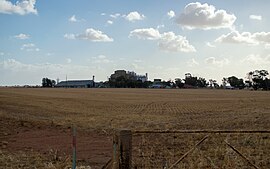Pinkerton Plains, South Australia
| Pinkerton Plains South Australia | |||||||||||||||
|---|---|---|---|---|---|---|---|---|---|---|---|---|---|---|---|
 Ridley Mill in Pinkerton Plains | |||||||||||||||
| Coordinates | 34°25′50″S 138°37′00″E / 34.430678°S 138.616693°E[1] | ||||||||||||||
| Population | 76 (2016 census)[2] | ||||||||||||||
| Established | 18 May 1995 (locality)[3] | ||||||||||||||
| Postcode(s) | 5400 [4] | ||||||||||||||
| Time zone | ACST (UTC+9:30) | ||||||||||||||
| • Summer (DST) | ACST (UTC+10:30) | ||||||||||||||
| Location | |||||||||||||||
| LGA(s) | Light Regional Council[1] | ||||||||||||||
| Region | Barossa Light and Lower North[1] | ||||||||||||||
| County | Gawler[1] | ||||||||||||||
| State electorate(s) | Light | ||||||||||||||
| Federal division(s) | Grey | ||||||||||||||
| |||||||||||||||
| |||||||||||||||
| Footnotes | Adjoining localities[1] | ||||||||||||||
Pinkerton Plains is a locality in the Mid North of South Australia, Australia.
The locality is named for William Pinkerton, an early pastoralist active in the region in the 1840s.[6] The land was originally the land of the Kaurna people. It is unclear when the area first became known as 'Pinkerton Plains', but references to Pinkerton Plains begin to appear in newspaper reports and South Australian Government documents from about 1866, which is about when the area was first settled. The area was settled by a number of Irish Catholic settlers, and in 1866, the St Benedict's Catholic Church was established there. The Church closed in 1900, but its cemetery remains in use by farmers in the area.[7]
In about 1868, a railway station was erected at Pinkerton Plains on the railway that ran through the locality.[8]
Pinkerton Plains School was established in 1886 and remained open until 1967.[7]
Pinkerton Plains' most famous resident was probably Nicholas McCabe, a notable farmer who invented 'McCabe's Wheat Pickler', a pickling device that was used by farmers across South Australia for a period of time.[citation needed]
References
[edit]- ^ a b c d e "Search results for 'Pinkerton Plains, LOCB' with the following datasets selected - 'Suburbs and localities', 'Counties', 'Government Towns', 'Local Government Areas', 'SA Government Regions' and 'Gazetteer'". Location SA Map Viewer. South Australian Government. Retrieved 13 January 2019.
- ^ Australian Bureau of Statistics (27 June 2017). "Pinkerton Plains (State Suburb)". 2016 Census QuickStats. Retrieved 13 January 2019.
- ^ Kentish, P.M. (18 May 1995). "GEOGRAPHICAL NAMES ACT, 1991 Notice to Assign" (PDF). The South Australian Government Gazette. Government of South Australia. p. 2156. Retrieved 13 January 2019.
- ^ "Postcode for Pinkerton Plains, South Australia". Postcodes Australia. Retrieved 13 January 2019.
- ^ a b c "Monthly climate statistics: Summary statistics ROSEWORTHY AWS (nearest weather station)". Commonwealth of Australia, Bureau of Meteorology. Retrieved 13 January 2019.
- ^ "Placename Details: Pinkerton Plains". Department of Planning, transport and Infrastructure, Government of South Australia. 5 July 2006. SA0055577. Archived from the original on 12 October 2016. Retrieved 25 August 2015.
- ^ a b "Place Names of South Australia - P". State Library of South Australia. Retrieved 25 August 2015.
- ^ Austlii.edu.au

